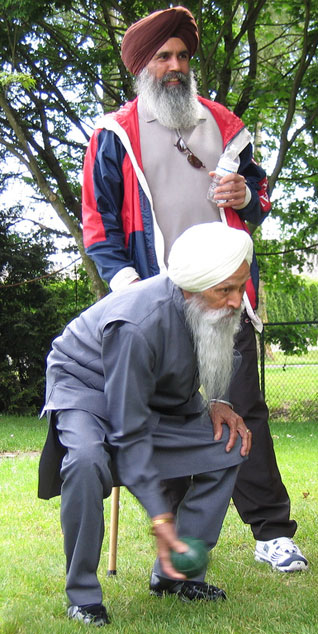Columnists
Life's New Chapter: A Time for Catch-Up?
by I.J. SINGH & ARDAMAN SINGH MADAN
There is a wry language around retirement.
Literally "re-tired" should mean to be tired once again. But that would make little sense. We would think to be well and deservedly tired once is enough!
To be retiring could also imply that one is withdrawn from whatever activity one engages in, and that could make sense for having a retiring demeanor, like a wallflower at a party.
One could be retired from a particular activity, say, something that puts food on the table with predictable regularity; but the time could be just as fully filled by an equally or even more satisfying pursuit, such as building model airplanes, hanging around at the beach, entertaining and educating grandchildren, or in community service.
How, then, to look at retirement?
Such are the idiosyncrasies of our culture that only moneymaking activities count; other avocations remain hobbies or pleasures that do not make the grade as vocations.
It is just like much of the work that women do in and around the home and family. Since no monetary value is attached to it, the concept of retirement from it does not exist. Patently unfair, we admit, but that's the way it is. Perhaps it is an admission of our inability to measure such work and its value in dollars and cents.
There is a difference between value and price, after all! We don't want to become the kind that knows the price of everything and the value of nothing.
One of us (ASM) has been retired for a few years from an engineering position that took him across this country building or fixing nuclear installations. He is now getting a little tired of retirement, and looking for ways to keep his mind and body engaged in life.
The other (IJS) is looking forward to impending retirement from a life in academia with mixed emotions, and some trepidation. Life was overly, tiringly, busy for decades; what will it be in retirement?
We have not asked our respective wives, but many women might think of her husband's retirement as "twice the husband at half the income." We prefer to think of retirement as a time when, in the words of Bob Hope, "the candles cost more than the cake."
The versifier Ogden Nash (should he be labelled a poet?) reminds us that:
"Senescence beginsAnd middle age ends
The day your descendents
Outnumber your friends."
Luckily for us, that point hasn't arrived quite yet.
Such meanderings, however, might lead us into landmines of conflicting notions of gender politics or random thoughts on the meaning of life. So, why don't we sidestep this temptation for now.
It seems that the greatest driving force in life is the desire to be useful and to be doing something meaningful. Is it this that lies at the core of life, or do we feel thus because we have been doing something for so long that we know not what else we could possibly do or want?
"Everything one does enough of eventually generates its own interest and one then begins to believe in it." One of us (IJS) had put these words (from Is There Intelligent Life on Earth? by the 1960's pop guru and writer Alan Dunn) on the frontispiece of his doctoral thesis.
Sure enough, one of the examiners caught it, and the first question at the thesis defense was, "What exactly do you mean by this?" A stimulating discussion interlaced with humour ensued.
What does Sikhism tell us to do with our lives?
Since most Sikhs are products of a complicated mix of Indian culture supplanted by Sikh teaching, which are often at odds with each other, it might be more rational and sensible to start by keeping in mind the context of the traditional Indian culture. Also remember that this culture stems largely from and reflects the Hindu world view.
The Hindu culture tells us - an idea that the Sikh world view absolutely abhors - to divide life into four equal segments: say, in the hypothetical 100-year lifespan, the first 25 years to grow up and learn a trade or skill to make a living; the next 25 to marry and nurture a family; the third quarter to slow down, enjoy the rewards of life and progressively to withdraw from worldliness, albeit gradually; and finally in the fourth quarter of life, to renounce the world, walk away from all attachments, go to the mountaintop or seek the seclusion of the forest, to find your soul - if you still have one.
This was and remains the Hindu model of a full life - not that we have seen it practiced much.
But this is decidedly not what Sikhi tells us to do. So how do we look at a full life?
First, let us trace the trajectory of a lifespan as most of us experience it, and as Guru Nanak framed it in a series of compositions:
Pehle piar lagaa thunn dudh/ doojae maaee baap kee suddh/ teeje bhayya bhaabi baib/ chuthae piar upanni khed/ punjvae khaan peen kee dhaat/ chhivae kaam naa puchhae jaat/ satvaesunj kia ghar vaas/ atthvae krodh hoa tan naas/ naavae dhaulae ubhe saah/ dasvae dya hoa suah/ gaaye sugeet pukaree dhaah/ udyaa hans dasaaye raah/ aayaa gayaa muyaa nas/ pichhae patal sadihu kaav/ Nanak manmukh andh piar/ baajh guru dubaa sansar
"In the beginning, the newborn cherishes the breast for its milk. Then comes an awareness of his parents. He learns to recognize his kin. The love for the play in life, including food and drink, follow. Lust awakens next and is limitless. He amasses wealth and toys. In time, his body is laid waste in wrath. He goes gray and his breathing is shallow. Finally, he is put to flames and returns to dust. His friends lament, but the soul has flown. Even his memory passes. Such is life spent in spiritual darkness." [GGS, MI, p.137]
Similar thoughts are powerfully reinforced repeatedly in the Guru Granth. We offer first a citation where our journey of life is visualized as parts of a single night in one's life. (In all the citations here, the translation is not an exact or literal rendering but is meant to capture the gist of the idea.)
Pehley pehrae raen kae/ vanjaryay mitra hukum bhaya garbhas ... hathho hathh nachayae pranee maat kahae sut mera ... Teejae pehare raen kae vanjarya mitra ... dhun joban sio chit ... Kaho Nanak pranee chauthe pehrae laavee lunya khayt
"The first phase of life is prenatal and neonatal; the second is the period of growing up; the third phase speaks of the needs of youth and is fixed largely on lust and material success; in the fourth and final phase, the grim reaper appears imminent to deliver one to the mystery of death." [GGS:75]
And again:
Duss balten, bees ravan, teesa kaa sunder kahavae/ chaleesi pur hoy pujassi pug khisae sathhi kaa budhepa aavae/ sattar kaa mut heen aseeha(n) kaa viohar naa pavae/ nahve ka sihjaasni mool na janay aasp bal/ dhandholim dhoodim dithh mae Nanak jug dhooye ka dhawalhar
"At 10 one is a child, at 20 a youth, at 30 handsome. At 40 he has really come of age (matured), at 50 he is on a downward slope, and at 60 impending old age finds him. At 70 his mind is failing, and at 80 all abilities have dimmed. At ninety he lies helpless and powerless. This world is a mansion of smoke." [GGS:138]
Much as there is an upward trajectory to early life, there is a downward slide in the latter half of it. Retirement is thus not a day, an hour or when one gets a gold watch, even as time and timeliness lose their relevance. Retirement is a process. It reflects entropy - the law of thermodynamics that defines and governs all stable systems. The best of stable systems, it tells us, gradually diminish in stability while they decay.
The Guru Granth (p.1427) speaks of three stages to a life: childhood, youth and old age (Baal Juani ur birdh foun teen awastha jaan), and that whatever is born must perish (Jo upjio so bins hae paro aaj kae kaal).
So, Sikhi does not suggest that we wait to do good until a time when the mind or the body are unwilling or unable to. The time to do good is now and always, as long as the mind-body connection works. Sikhi exhorts us to do good in this world - vich dunya sev kamayae ta dargeh baesan payae [GGS:26]
If the goal of life is to nurture the divinity that is in all of us - munn too jote saroop hae apna mool pehchaan [GGS:441] - then one need not, indeed must not, wait until retirement from life to start on the path. The time to try and discover the universal and ultimate reality that connects us all is not when we retire, but now. It is a habit to be cultivated over a lifetime.
Surely, there is a joy to doing nothing, but it is strictly transitory, though it is not without purpose. It is like leaving the land fallow for a season, so that it can be ready for reseeding and replanting. Similarly, for the mind and body. Retirement is not for the rest of one's life, not even for a quarter of it. (And no one knows when, for anyone, that last quarter starts or ends.)
Inevitably, a time comes when our day in the sun is truly done and the baton must pass to another generation. This a law that can never be overturned, only obeyed elegantly with grace.
And that is what we Sikhs call "Hukam."
Whether at work or play, we inherit a world with a host of gifts and a truckload of flaws. This is what the generations past have willed to us. The only way to repay the debt is to leave the world a little bit better, perhaps with fewer or different shortcomings than we inherited.
Retirement then becomes an active phase albeit with a shifted focus. Therein lies immortality.
To be able to answer the question posed by Guru Amardas:
Eh sareera mairya iss jug meh aaye kae, kya toudh karam kamayya [GGS:922]
In other words, what footprints will we leave in the sands of time?
Indeed, life is eternal.
July 13, 2009
Conversation about this article
1: Aryeh Leib (Israel), July 14, 2009, 4:08 AM.
Hmmmmm. In this context, maybe "re-tired" means putting a new set of treads on the wheels - the better to travel many more miles down the road! To live in God's presence - the paramount purpose of our lives - doesn't necessarily mean being "productive"; something that tends to be forgotten in this accomplishment-driven society in which we presently find ourselves.
2: I.J. Singh (New York, U.S.A.), July 14, 2009, 8:19 AM.
Ayreh, a point well made. but perhaps we need to embrace a more expansive definition of the word, "productive". "To live in God's presence" would indeed be the purpose of existence, and that would become a most productive life. Hence, my brief rif on "value" and "price" in the text.
3: Aryeh Leib (Israel), July 15, 2009, 6:26 AM.
Inder ji, I was referring to "productive" in the Western world's prevalent definition, ie., in the dollars-and-cents sense.
4: Pritam Singh Grewal (Canada), July 16, 2009, 11:40 AM.
This article beautifully brings out various phases of human life as depicted in Gurbani. It also reminds one of the seven ages of man - "All the world is a stage..." from Shakespeare's play, As You Like It. In the shabad 'Pehle piar ...' the line should read 'Dasvae dhada hoa suah' - not, 'dya hoa suah.'
5: I.J. Singh (New York, U.S.A.), July 17, 2009, 5:19 PM.
Thank you, Pritam Singh ji, for pointing out my error in transcribing gurbani.






